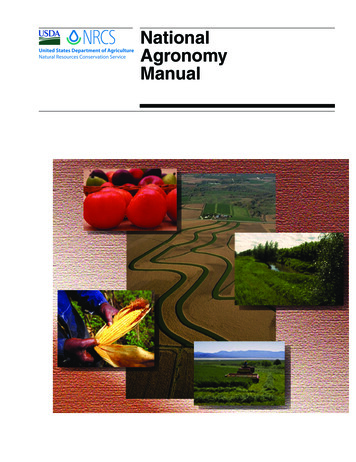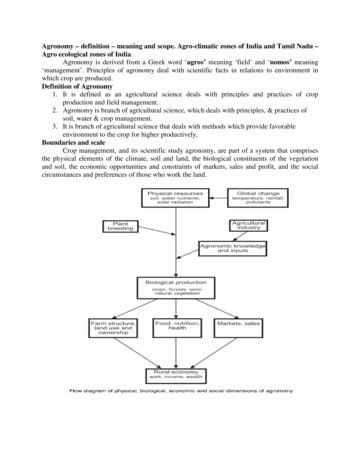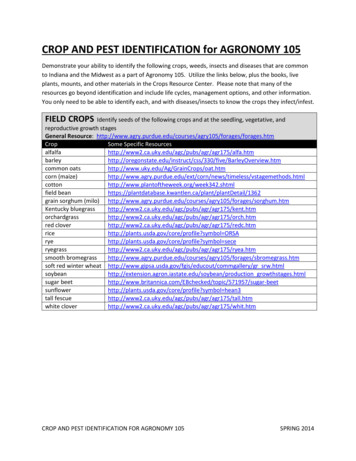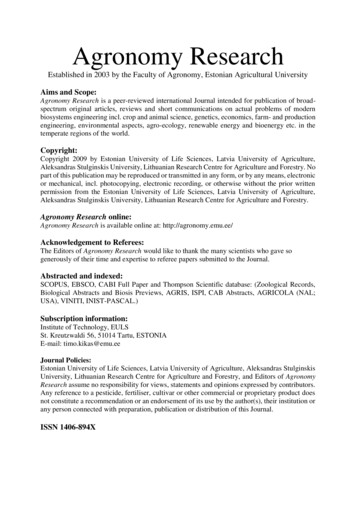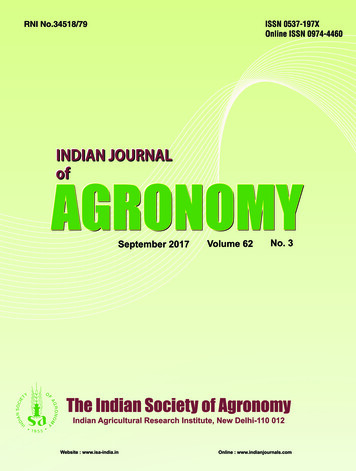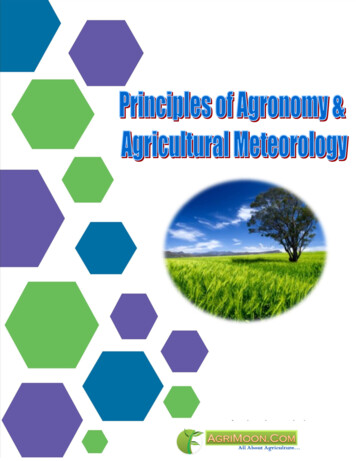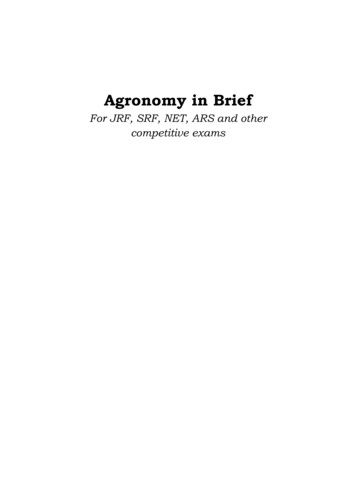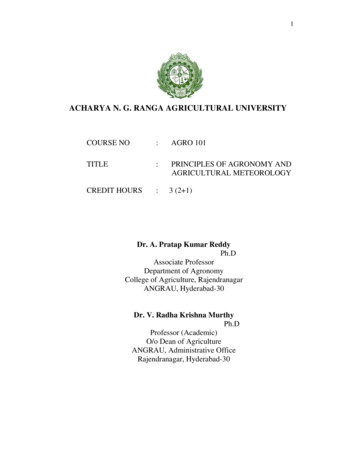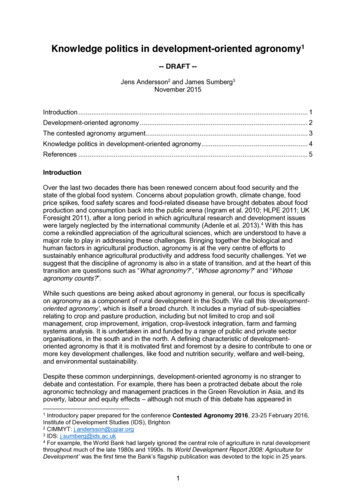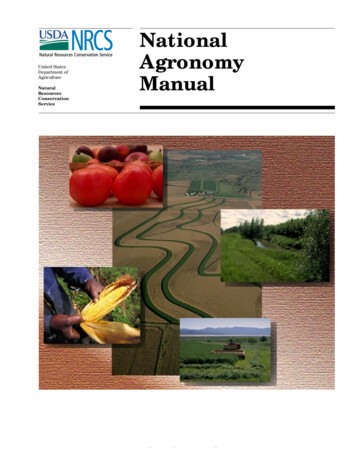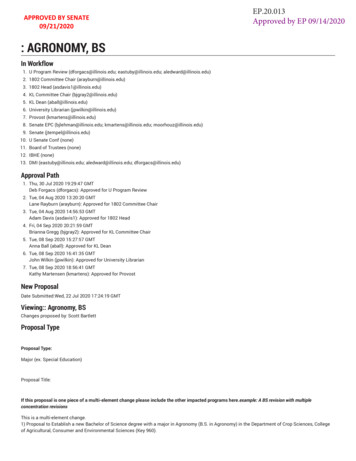
Transcription
APPROVED BY SENATE09/21/2020EP.20.013Approved by EP 09/14/2020: AGRONOMY, BSIn Workflow1. U Program Review (dforgacs@illinois.edu; eastuby@illinois.edu; aledward@illinois.edu)2. 1802 Committee Chair (arayburn@illinois.edu)3. 1802 Head (asdavis1@illinois.edu)4. KL Committee Chair (bjgray2@illinois.edu)5. KL Dean (aball@illinois.edu)6. University Librarian (jpwilkin@illinois.edu)7. Provost (kmartens@illinois.edu)8. Senate EPC (bjlehman@illinois.edu; kmartens@illinois.edu; moorhouz@illinois.edu)9. Senate (jtempel@illinois.edu)10. U Senate Conf (none)11. Board of Trustees (none)12. IBHE (none)13. DMI (eastuby@illinois.edu; aledward@illinois.edu; dforgacs@illinois.edu)Approval Path1. Thu, 30 Jul 2020 19:29:47 GMTDeb Forgacs (dforgacs): Approved for U Program Review2. Tue, 04 Aug 2020 13:20:20 GMTLane Rayburn (arayburn): Approved for 1802 Committee Chair3. Tue, 04 Aug 2020 14:56:53 GMTAdam Davis (asdavis1): Approved for 1802 Head4. Fri, 04 Sep 2020 20:21:59 GMTBrianna Gregg (bjgray2): Approved for KL Committee Chair5. Tue, 08 Sep 2020 15:27:57 GMTAnna Ball (aball): Approved for KL Dean6. Tue, 08 Sep 2020 16:41:35 GMTJohn Wilkin (jpwilkin): Approved for University Librarian7. Tue, 08 Sep 2020 18:56:41 GMTKathy Martensen (kmartens): Approved for ProvostNew ProposalDate Submitted:Wed, 22 Jul 2020 17:24:19 GMTViewing:: Agronomy, BSChanges proposed by: Scott BartlettProposal TypeProposal Type:Major (ex. Special Education)Proposal Title:If this proposal is one piece of a multi-element change please include the other impacted programs here.example: A BS revision with multipleconcentration revisionsThis is a multi-element change.1) Proposal to Establish a new Bachelor of Science degree with a major in Agronomy (B.S. in Agronomy) in the Department of Crop Sciences, Collegeof Agricultural, Consumer and Environmental Sciences (Key 960).
2) Deactivate the Crops concentration (Key 763).3) Deactivate the Plant Protection concentration (Key 765).4) Deactivate the Biological Sciences concentration (Key 761).EP Control NumberEP.21.013Official Program NameAgronomy, BSEffective Catalog TermFall 2021Sponsor CollegeAgr, Consumer, & Env SciencesSponsor DepartmentCrop SciencesSponsor NameA. Lane RayburnSponsor Emailarayburn@illinois.eduCollege ContactBrianna GreggCollege Contact Emailbjgray2@illinois.eduProgram Description and JustificationProvide abriefdescription and justification of the program, including highlights of the program objectives, and the careers, occupations, or furthereducational opportunities for which the program will prepare graduates, when appropriate.Many students are highly interested in acquiring employable skillsets in sustainable agriculture production solutions to address urgent globalchallenges to food security and environmental sustainability. The proposed new Bachelor of Science in Agronomy degree incorporates courses incrop sciences, plant biology, soil pest management, plant protection, environmental quality and data analysis to provide a comprehensive educationin agronomy. This interdisciplinary curriculum prepares students for careers in a variety of different fields. This major also allows enough flexibility forstudents to take courses in various disciplines within the 126 total hours.
The proposed new degree is a combination of three concentrations within the Bachelor of Science in Crop Sciences degree program for more than 10years: Crops, Plant Protection, and Biological Sciences. This new major has the advantage of consolidating relatively low enrollments across thesefour concentrations in one, cohesive major. Additionally, this major addresses a need identified by a recent departmental external review.Corresponding DegreeBS Bachelor of ScienceIs this program interdisciplinary?NoAcademic LevelUndergraduateWill you admit to the concentration directly?NoIs a concentration required for graduation?NoCIP Code011102 - Agronomy and Crop Science.Is This a Teacher Certification Program?NoWill specialized accreditation be sought for this program?NoInstitutional ContextUniversity of Illinois at Urbana-ChampaignDescribe the historical and university context of the program's development. Include a short summary of any existing program(s) upon which thisprogram will be built.Explain the nature and degree of overlap with existing programs and, if such overlap exists, document consultation with the impacted program’s homedepartment(s).In Spring 2020, 27 out of 119 total Crop Sciences students (22.7%) were enrolled in the four concentrations that are being consolidated into theproposed major. In a self-evaluation of our curriculum and through an external review of the department, we determined that a lack of a comprehensiveoffering of agronomy, the science of agricultural production, is limiting student enrollment in the program and not taking advantage of key employment
opportunities. The creation of this new major would enhance student identity, provide greater prominence to this area of diverse expertise in the CropSciences, and address student needs while preparing them with skillsets for known employment opportunities in the field of agriculture.University of IllinoisBriefly describe how this program will support the University's mission, focus and/or current priorities. Demonstrate the program's consistency withand centrality to that mission.Our program in Agronomy addresses the University of Illinois mission as a land grant institution by providing education on and putting knowledgeto work on agricultural production. We anticipate that increasing our number of B.S. graduates will increase our regional and national standing as aleader in the agricultural production field, and would help us fortify current and develop new corporate partnerships to support student education andresearch efforts.Since we have information regarding student enrollment in the corresponding concentration for the past 20 years, we will be able to assess whetherthe new degree program results in increased student enrollment.State of IllinoisIndicate which of the following goals of the Illinois Board of Higher Education's Strategic Initiative are supported by this program: (choose all thatapply)Integration of Educational, Research and Innovation Assets - Better integrate Illinois' educational, research and innovation assets to meet economicneeds of the state and its regions.Describe how the proposed program supports these goals.Integration of Educational, Research and Innovation Assets: The Crop Sciences Department is already a leader in developing superior employees/leaders in the field of plant biotechnology. By more critically focusing the Agronomy core curriculum, the students graduating from this program willbe more prepared and therefore more beneficial to potential employers. Having Agronomy as a major will also let more students self-identify withthe program and therefore increase visibility, while also linking to employment opportunities that commonly advertise for ‘agronomy’ skillsets. It willalso potential employers, including the department’s traditional stakeholders, to more successfully identify our students with their true discipline. Weanticipate that a major in Agronomy, which is offered by many of our peer and competing institutions (e.g., Iowa State, Purdue) will meet the demandfor specific credentials and justify cost for students and their families.Admission RequirementsDesired Effective Admissions TermFall 2021Provide a brief narrative description of the admission requirements for this program. Where relevant, include information about licensurerequirements, student background checks, GRE and TOEFL scores, and admission requirements for transfer students.The minimum GPA for admission consideration is 2.50 (A 4.00). Transfer coursework equivalent to the University of Illinois courses listed in bold, reditalics must be successfully completed prior to the desired term of entry.Sophomore-level transfer admission requires completion of transfer coursework equivalent to the following University of Illinois courses:CHEM 101, Introductory Chemistry or an introductory chemistry course with LabMATH 112, Algebra or higher1Junior-level transfer admission requires completion of transfer coursework equivalent to the followingUniversity of Illinois courses:CHEM 102, General Chemistry I and CHEM 103, General Chemistry Lab ICHEM 104, General Chemistry II and CHEM 105, General Chemistry Lab II
MATH 220, Calculus or MATH 234, Calculus for Business IDescribe how critical academic functions such as admissions and student advising are managed.Our Undergraduate Recruiter engages with prospective and admitted students via marketing, recruitment events, campus visits, etc. Once studentsaccept their offer of admission, our Academic Program Manager becomes their primary academic advisor and guides them through degreerequirements. Additionally, students are assigned to faculty mentors for career, internship, research, and graduate school advising.EnrollmentNumber of Students in Program (estimate)Year One Estimate305th Year Estimate (or when fully implemented)75Estimated Annual Number of Degrees AwardedYear One Estimate05th Year Estimate (or when fully implemented)30What is the matriculation term for this program?FallWhat is the typical time to completion of this program?8 semestersWhat are the minimum Total Credit Hours required for this program?126Delivery MethodThis program is available:On Campus
BudgetWill the program or revision require staffing (faculty, advisors, etc.) beyond what is currently available?NoResource ImplicationsFacilitiesWill the program require new or additional facilities or significant improvements to already existing facilities?NoTechnologyWill the program need additional technology beyond what is currently available for the unit?NoNon-Technical ResourcesWill the program require additional supplies, services or equipment (non-technical)?NoResourcesFaculty ResourcesPlease address the impact on faculty resources including any changes in numbers of faculty, class size, teaching loads, student-faculty ratios, etc.Describe how the unit will support student advising, including job placement and/or admission to advanced studies.Current departmental teaching loads and class sizes are generally low, and the undergraduate-to-faculty FTE rate is less than 5. We therefore havethe capacity to increase student enrollment without significant negative impacts on faculty resources. Current faculty who are teaching the threeconcentrations will be responsible for teaching this major.Library ResourcesDescribe your proposal's impact on the University Library's resources, collections, and services. If necessary please consult with the appropriatedisciplinary specialist within the University Library.The library currently has a strong collection in the area of Agronomy which is currently used by our students, including the Funk Library. We do notanticipate a large impact.
Instructional ResourcesWill there be any reduction in other course offerings, programs or concentrations by your department as a result of this new program/proposedchange?YesPlease describeAdditional capacity currently exists within the departmental courses that will serve as core courses for the major, such that we anticipate a two-foldincrease in current enrollment (from 10-15 to 20-30 students per cohort) would not significantly affect existing courses. Additional sections and/orofferings of certain core courses can be added as necessary.The existing three concentrations under the BS in Crop Sciences major that would be addressed by the proposed Agronomy major will be graduallyphased out as students currently enrolled in the program graduate or transfer to the new degree program, and would be eliminated once there are nolonger any students enrolled in the concentration (by approximately 2024).Does this new program/proposed change result in the replacement of another program?NoDoes the program include other courses/subjects impacted by the creation/revision of this program?YesRequired coursesIB 103 - Introduction to Plant BiologyIB 150 - Organismal & Evolutionary BiolACES 101 - Contemporary Issues in ACESACES 200 - ACES Transfer OrientationNRES 201 - Introductory SoilsExplain how the inclusion or removal of the courses/subjects listed above impacts the offering departments.This major will be supported by course offerings in the School of Integrative Biology (IB), and the Department of Natural Resources and EnvironmentalSciences (NRES). All of these courses are at the introductory level or serve as required courses for these programs, therefore they are offered regularlyand have large capacities. Our concentration students currently take these courses, and thus we do not anticipate that the new degree program wouldhave any significant impact on these courses.Attach letters of support from other departments.IB Letter of Support Email.pdfNRES support letter CPSC Agronomy Major.pdfFinancial ResourcesHow does the unit intend to financially support this proposal?As this program is currently offered as a collection of four closely related concentrations under an existing major, the existing infrastructure exists withthe Department of Crop Sciences to support the program.
Will the unit need to seek campus or other external resources?NoAre you seeking a change in the tuition rate or differential for this program?YesMarket DemandWhat market indicators are driving this proposal? If similar programs exist in the state, describe how this program offers a unique opportunity forstudents:Many of our peer institutes with whom we compete for agricultural science students offer an Agronomy major. However, in Illinois there is noAgronomy major. According to the University of Wisconsin, only 61% of agronomy job openings are being met by qualified candidates. With the risein technologies aimed at enhancing agricultural production (e.g., precision agriculture, digital agriculture), foundational knowledge in crop productionsystems provided by a major in Agronomy is anticipated to be important.The U.S. Bureau of Labor Statistics projects a 7% increase in demand for agricultural scientists during the 2018-2028 period, which they classify as“faster than average”. Within the jobs categorized as agricultural science, the classification of “soil and plant scientists” – the classification mostlyclosely aligned with agronomy – is projected to be 8%.What type of employment outlook should these graduates expect? Explain how the program will meet the needs of regional and state employers,including any state agencies, industries, research centers, or other educational institutions that expressly encourage the program's development.We anticipate that, similar to past graduates, our future graduates will readily find job opportunities in the agricultural production and research anddevelopment sector. Employment opportunities for agronomy majors include crop production and soil management, yield forecasting, precisionfarming, plant breeding, agricultural business and industry, agricultural service organizations, environmental and natural resource management, andfarm management. Private sector include the seed, fertilizer, and agricultural chemical industries as field agronomists, crop and soil managementspecialists, research technicians, sales and marketing specialists, and production managers. Public sector (state and federal agencies) also employagronomists as extension specialists, county extension directors, environmental and natural resource specialists, research associates, soil surveyors,soil conservationists, grain inspectors, integrated pest management, land appraisal, agricultural finance, and in other science-based professionalpositions.What resources will be provided to assist students with job placement?The departmental academic advising office offers general assistance to students regarding their university career, while ACES Career Servicesprovides career-related assistance. Additionally, each student is assigned a Faculty Mentor in their first year to help prepare them for their futurecareers. Not only do Faculty Mentors provide specific career-related advice, they also assist students throughout their four years by guiding themto the most appropriate courses, helping them find and apply to internships or research programs, and serving as recommendation letter writers forpost-graduation opportunities. We anticipate that our departmental post-graduation placement rate of 80% (including graduates either employed orpursuing advanced degrees) will remain high in the future.Program Regulation and AssessmentBriefly describe the plan to assess and improve student learning, including the program’s learning objectives; when, how, and where these learningobjectives will be assessed; what metrics will be used to signify student’s achievement of the stated learning objectives; and the process to ensureassessment results are used to improve student learning. (Describe how the program is aligned with or meets licensure, certification, and/orentitlement requirements, if applicable).Not applicable.Is the career/profession for graduates of this program regulated by the State of Illinois?No
Program of Study“Baccalaureate degree requires at least 120 semester credit hours or 180 quarter credit hours and at least 40 semester credit hours (60 quarter credithours) in upper division courses” (source: es2017.pdf). For proposals for new bachelor’s degrees,if this minimum is not explicitly met by specifically-required 300- and/or 400-level courses, please provide information on how the upper-division hoursrequirement will be satisfied.All proposals must attach the new or revised version of the Academic Catalog program of study entry. Contact your college office if you havequestions.For new programs, attach Program of StudyAgronomy - Learning Outcomes.pdfCatalog Page TextCatalog Page Text: Description of program for the catalog page. This is not official content, it is used to help build the catalog pages for the program.Can be edited in the catalog by the college or department.Agronomy is the fundamental agricultural science: managing multiple parts of agricultural systems to sustainability and economically meet thegrowing need for food, fuel and fiber. The agronomy major provides a foundation that by necessity integrates the science and practice of agriculturalproduction through courses in plant biology, genetics, weed and pest management, soil science, environmental quality, and agricultural managementpractices. The program also offers many opportunities to participate in research and internships. This curriculum prepares students for careers inagricultural sciences as well as for entrance into graduate and professional schools. Our students pursue employment in scientific research or fieldsrelated to agronomy including crop consulting, soil and crop management, international food security and agricultural development, and sciencepolicy.Statement for Programs of Study CatalogGeneral Education ion I and Speech6 to 7RHET 105& CMN 101Writing and Researchand Public SpeakingORCMN 111& CMN 112Oral & Written Comm Iand Oral & Written Comm IIAdvanced Composition3 to 4Cultural Studies9Western/Comparative CulturesNon-Western CulturesUS Minority CulturesForeign LanguageThird Level or AboveQuantitative Reasoning IMATH 2204 to 5Calculusor MATH 221Calculus Ior MATH 234Calculus for Business I
Quantitative Reasoning IICPSC 2413Intro to Applied StatisticsNatural Sciences and TechnologyCHEM 102& CHEM 103General Chemistry Iand General Chemistry Lab ICHEM 104& CHEM 105General Chemistry IIand General Chemistry Lab II8Humanities and the Arts6Social and Behavioral SciencesACE 100Introduction to Applied Microeconomics17 to 8Total Hours for Gen Ed Requirements46-50CodeHoursTitleACES RequirementsACES 101or ACES 2000-2Contemporary Issues in ACESACES Transfer OrientationMajor RequirementsCodeTitleNon-Departmental Core RequirementsHours12IB 103Introduction to Plant Biology4IB 150Organismal & Evolutionary Biol4NRES 201Introductory SoilsCrop Sciences Core RequirementsCPSC 102Foundational Skills in Crop SciencesCPSC 112Introduction to Crop SciencesInternship or Research/Thesis (choose one):CPSC 393or HORT 393CPSC 395242-3Crop Sciences InternshipHorticulture InternshipUndergrad Research or Thesisor HORT 395Undergrad Research or Thesisor PLPA 395Undergrad Research or ThesisCPSC 498413-14Crop Sci Professional DevelpmtAgronomy Requirements114CPSC 212Introduction to Plant Protection4CPSC 336Tomorrow's Environment3CPSC 352Plant Genetics4CPSC 382Organic Chem of Biol Processes4CPSC 418Crop Growth and ManagementMajor ElectivesChoose from any 300- or 400- level CPSC, HORT, or PLPA courses,excluding:CPSC 393,HORT 393,CPSC 395,HORT 395&PLPA 395.EP DocumentationDMI DocumentationKey: 960315
COLLEGE OF AGRICULTURAL, CONSUMER & ENVIRONMENTAL SCIENCESDepartment of Natural Resources and Environmental SciencesW-503 Turner Hall, MC-0471102 S. Goodwin Ave.Urbana, IL 61801-4730RE: Proposed Crop Sciences Major in AgronomyJuly 21, 2020Dear Dr. Rayburn,The Department of Natural Resources and Environmental Sciences fully supports the proposed newmajor in Agronomy in the Department of Crop Sciences. One of our courses, Introductory Soils (NRES201) will be a required course for the new major. We do not foresee this requirement as having anynegative impacts on our department. NRES 201 will continue to be taught in both fall and springsemesters. Plus, Crop Science students in the current concentrations, which will be combined into thenew major, already enroll in NRES 201. So, course capacity should not be an issue.We look forward to working with Crop Sciences to make sure NRES 201 remains a valuable foundationalcourse for your majors.Best regards,Robert L. SchooleyProfessor and Interim HeadUNIVERSITY OF ILLINOIS AT URBANA-CHAMPAIGN217.333.2770 nres.illinois.edu
From:To:Cc:Subject:Date:Downie, Stephen RRayburn, A LaneBartlett, Scott ERe: Agronomy, BS proposed by Crop SciencesSunday, July 12, 2020 11:25:29 AMDear Dr. Rayburn,The School of Integrative Biology (SIB) has reviewed your proposal to establish a new BSdegree with a major in Agronomy (B.S. in Agronomy) in the Department of Crop Sciences,ACES. We understand that three concentrations will be deactivated simultaneously, and thatthis new major will require IB 103 (Introduction to Plant Biology) and IB 150 (Organismaland Evolutionary Biology). We have ample seats in both of these course and have thecapacity to increase enrollment without significant negative impacts on faculty and otherinstructional resources. As you know, these two courses are offered regularly, and in responseto the Covid-19 pandemic these courses will be offered online for the immediate future.If you wish additional information, please do not hesitate to contact me. I wish you well inyour new program.Sincerely,Stephen R. DownieAssociate Director of Academic AffairsSchool of Integrative BiologyOn 7/10/20 4:37 PM, Rayburn, A Lane wrote:Dear Dr. Downie,Crop Sciences is proposing an Agronomy, BS, Major (see attached). This new major is atransition from three concentrations to one major.This major requires IB 103 and IB150. These courses will provide an excellent foundation for students in the proposedmajor.We would appreciate an approval letter from you as soon as possible with regards theimpact on your department.Thank you for your time and consideration in this matter.Sincerely,Dr. A. Lane RayburnProfessor of CytogeneticsUnderGraduate Program CoordinatorDepartment of Crop SciencesUniversity of Illinois360 ERML, 1201 W. GregoryUrbana, IL 61801Telephone - 217 333-4374.http:// rayburn
-Stephen R. Downie, ProfessorAssociate Director of Academic Affairs School of Integrative BiologyDirector GAANN FellowshipsCurator University of Illinois Vascular Plant Herbarium (ILL)Department of Plant Biology 239 Morrill Hall 505 S Goodwin AveUniversity of Illinois at Urbana-Champaign Urbana IL 61801-3707Telephone: (217) 333-1275Email: ww.life.illinois.edu/plantbio/
AgronomyLearning Outcomes1. Students will demonstrate proficiency in the areas of crop production, plant breeding, pathogencontrol, soil and nutrient management, genetics and genomics, environmental quality, and dataanalysis.2. Students will gain leadership skills through team-based science in an experiential learning context tobecome leaders in scientific fields.3. Students will communicate agronomy content to the public using traditional and 21st century mediaplatforms.4. Students will discover how agronomy can be used as the foundation to solve global and regional foodsecurity challenge, and how agronomy is an ever-evolving field poised to meet the demand for food of agrowing population.5. Students will develop professional networks that will enhance future career choices.
Sep 21, 2020 · 1) Proposal to Establish a new Bachelor of Science degree with a major in Agronomy (B.S. in Agronomy) in the Department of Crop Sciences, College of Agricultural, Consumer and Environmenta
